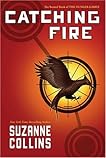 From Goodreads: The city of Ember was built as a last refuge for the human race. Two hundred years later, the great lamps that light the city are beginning to flicker. When Lina finds part of an ancient message, she’s sure it holds a secret that will save the city. She and her friend Doon must decipher the message before the lights go out on Ember forever!
From Goodreads: The city of Ember was built as a last refuge for the human race. Two hundred years later, the great lamps that light the city are beginning to flicker. When Lina finds part of an ancient message, she’s sure it holds a secret that will save the city. She and her friend Doon must decipher the message before the lights go out on Ember forever!
I read this book years ago, and fell in love with it at first sight. It was an amazing read. As a young teenager, I didn’t think science-fiction could get any better than this. The characters spoke to me, the setting marvelled me, the story had me on the edge of my seat. When I found out a movie was going to be made about it, I squealed. Literally. And excitedly jumped up and down for about five minutes.
I have reread it with critical eyes. I found that even though I still appreciated the book, I no longer adored it like when I was younger. I was nonetheless drawn in and interested throughout the book. That, I believe, is the true mark of a good children’s book: it can mesmerize teenagers and adults as well as children.
The characters were interesting, and well constructed, though many things were left untold. I would’ve liked a little more characterization, but then again, it’s a children’s book; so if it were any longer it probably would’ve discouraged the less motivated readers.
The world created was probably what I loved best, and I remember, for weeks after reading this book, how I had an unhealthy obsession with caves. Indeed, the world Lina and Doon live in is built entirely underground, in a huge, brightly-lit, cave. I loved how it was completely decrepit, and how everyone lived in a perpetual state of need, and how there wasn’t enough of anything anymore and the people of Ember had to adapt and recycle literally everything. The ever-lasting longing every citizen of Ember felt for things as essential as food was extremely well described, and this is probably one of the strongest points of the book, with the world-building: the beautiful yet simple very descriptive writing.
The plot in itself is also interesting, though not quite original enough for me to love it. Indeed, it is a basic, simple, “we need to save the world” plotline, with not much twist to it. If it wasn’t for the amazing world, it probably would’ve been a very bland book. So don’t read this book expecting to see an amazing story, because there isn’t one: the true impressiveness of this book lies in the city of Ember itself.
It is a good read; fun, without being light-headed, serious, without drowning the reader in dark themes and nerve-wracking plot-lines. Some issues were still talked about, like corruption, poverty and how a society faces a crisis, but it wasn’t painfully moralizing like some other books. Overall, a nice, quick read that I recommend to those of you who still feel young at heart and want a fast-paced, interesting novel for a weekend’s entertainment.
-Aithen
The City of Ember by Jeanne Duprau
Rating: 7,7/10
P.S.: This book has been made into a movie, but I haven’t seen it yet and the critiques about it are awful. Do any of you have comments about this?





 Noughts and Crosses
Noughts and Crosses The Lovely Bones
The Lovely Bones The Book Thief
The Book Thief The Garden of Everlasting Spring
The Garden of Everlasting Spring















